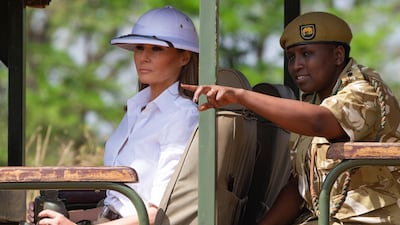It is pointless to parse US first lady Melania Trump's outfits for meaning, as the former model is not known to be passionate about political causes. But the white pith helmet she wore on a visit to Nairobi National Park in Kenya, part of her four-country tour of Africa, deserves scrutiny.
The pith helmet, originally made from material derived from the stems of an Indian swamp plant, is seen as a quaint but instantly recognisable symbol of European colonial rule. Routine for westerners in the tropics from the mid-19th century, the helmet exemplified the notion of race-based biological difference. Dark-skinned natives were supposed to have thicker skulls than Europeans, who therefore needed the protection offered by a pith helmet, otherwise known as a sola topi.
That was then. The sweep of decolonisation after World War Two consigned the pith helmet to the collective museum of malevolent objects, except for occasional outings on Hollywood film sets and in safari fashion.
In choosing the helmet for a diplomatic visit, however, Mrs Trump has revived the debate about western attitudes to Africa, and by extension, the entire post-colonial world. By electing to dress like a 19th-century colonial settler in Kenya, America’s first lady has unwittingly raised questions that are often asked in less public forums. Did the empire ever really end? Is colonisation a perspective, one that can exist even without physical colonies?
These are touchy subjects. Any encounter between the West and the rest must address aspects of that bruising, humiliating, long-ago engagement. The scars of the colonial encounter remain, as do rooms full of plundered artifacts in museums in London, Paris, Brussels and Berlin.
Despite these unresolved issues, Mrs Trump’s headgear is definitely out of sync with the times. Strenuous attempts are under way in several European countries to reckon with the colonial past, and to negotiate new ways of dealing with citizens of the former colonies.
Consider recent developments. In September, Emmanuel Macron, the president of France, acknowledged the systemic use of torture by the French military in Algeria in the 1950s and 1960s. He also authorised the opening of archives concerning those who disappeared.
In August, Germany returned the remains – 19 skulls, a scalp and bones from five skeletons – of Namibians killed by German forces more than a century ago. In so doing, Germany continued a relatively recent trend of remorse via repatriation that saw France ship back to New Zealand the mummified heads of 20 Maori warriors in 2012. Lodged in a Paris museum, the Maori remains were a symbol of a particular period in human history, one when the pursuit of scientific knowledge was cheered, regardless of how it was acquired.
Now, well into the second half-century of decolonisation, new demands for respect are being made of European museums dedicated to natural history, science, medicine and archaeology. Former colonies are asking them to return human remains acquired in dubious and often violent circumstances. In 2015, Zimbabwe, just like the Namibian and Maori peoples, asked UK to send back the skulls of its “freedom-fighter” chiefs, killed by British occupiers in the 19th century.
There is also a new mood of acknowledgement in European capitals about the propriety of holding on to colonial-era masks, thrones, statues and jewellery. Until recently, the arguments against their return ran as follows: they are safer and better preserved in the West, and as a universal treasure, they should be on display where the world will see them.
But this has started to change. Late last year, Mr Macron declared in Burkina Faso that France would work toward the “temporary or permanent restitution of African heritage to Africa”. The Victoria and Albert Museum in London is considering a long-term loan to Ethiopia of a gold crown and chalice taken by the British army in 1868. The German Lost Art Foundation has earmarked funding for museums to start examining their collections for illegally-obtained objects next year.
Even more significant is the change soon to be unveiled at the Royal Museum for Central Africa in Brussels. It reopens on December 1 after a five-year renovation. In that period, the museum searched for a new way to tell the horrific story of Belgium in the Congo and the atrocities committed against the Congolese.
That is a huge change. The Museum grew out of a temporary human zoo that showcased living Congolese men, women and children in “native conditions”. It was established 60 years ago in Brussels and even without the live human displays, the Museum’s head admits it remained “a colonial institution … The Africans we portray here are naked with a spear, without a culture of their own.”
The re-balancing of the narrative has begun. But Mrs Trump’s pith helmet shows how far we still need to go.


